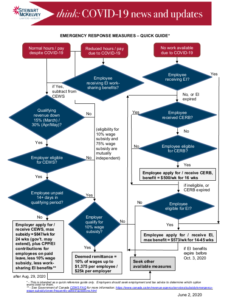Taking stock: Quick reference guide for government initiatives
*Flowchart below last updated June 2, 2020 (Originally published April 14, 2020)
With the passing of Bill C-14, the COVID-19 Emergency Response Act, No. 2 on April 11, 2020, the federal government has now laid a legislative foundation for various initiatives to assist employers and employees who are affected by COVID-19. The main measures include:
- The new Canada Emergency Response Benefit (“CERB”)
- The new Canada Emergency Wage Subsidy (“CEWS”), a 75% wage subsidy for eligible employers for the 12-week period beginning March 15, 2020
- The new 10% Temporary Wage Subsidy for employers
- Enhanced access to Employment Insurance (“EI”) benefits, including streamlining applications to the EI work-sharing program
Details on emergency response measures have shifted over the past few weeks, as they have evolved in response to our ever-changing situation. We expect this evolution will continue in many respects; notably, we are still awaiting regulations to further clarify some details related to CERB and CEWS.
However, given that the legislation now appears to be place, it seems an opportune moment for a fresh look at the current landscape of options. Recognizing it is a busy time, it is our pleasure to provide a dynamic summary of the mutual interactions between CERB, CEWS, EI and the 10% wage subsidy. We trust this will serve as a helpful reference point when seeking employment and tax advice to find the best options in the circumstances.
*Link to printable PDF version here.
This article is provided for general information only. If you have any questions about the above, please contact a member of our Labour and Employment group.
Click here to subscribe to Stewart McKelvey Thought Leadership articles and updates.
Archive
Rick Dunlop In my December 15, 2016 article, Federal Government’s Cannabis Report: What does it mean for employers?, I noted the Report’s1 suggestion that there was a lack of research to reliably determine when individuals are impaired…
Read MoreRick Dunlop and Michelle Black On March 14, 2014, CanMar Contracting Limited (“CanMar”) granted a day off to two of its hard working and longer serving employees so they could spend time with their respective families. That…
Read MoreJoe Thorne and Meaghan McCaw The doctrine of unconscionability is an equitable remedy available in exceptional circumstances where a bargain between parties, be it a settlement or a release, may be set aside on the basis that…
Read MoreJonathan Coady After more than five years, the Prince Edward Island Information and Privacy Commissioner (the “Privacy Commissioner”) has completed her review into more than sixty records withheld by a local school board on the…
Read MorePeter McLellan, QC & Richard Jordan Introduction On February 21, 2017 the Nova Scotia Government passed Bill 75 – the Teachers’ Professional Agreement and Classroom Improvement (2017) Act. This Bulletin will provide some background to what is, today,…
Read MoreBruce Grant, QC and Justin Hewitt In the recent decision of Scotia Mortgage Corporation v Furlong1 the Supreme Court of Newfoundland and Labrador confirmed that where a law firm acts jointly for the borrower and lender in the placement…
Read MoreThe Supreme Court of Canada released its decision in Sabean v Portage La Prairie Mutual Insurance Co, 2017 SCC 7 at the end of January, finally answering an insurance policy question that had divided the lower…
Read MoreIn preparing for the 2017 proxy season, you should be aware of some regulatory changes and institutional investor guidance that may impact disclosure to, and interactions with, your shareholders. This update highlights what is new…
Read MorePerlene Morrison and Hilary Newman During the fall 2016 legislative sitting, the Province of Prince Edward Island passed legislation that results in significant changes to the Planning Act. The amendments received royal assent on December 15, 2016 and…
Read MoreJoe Thorne1 and Justin Hewitt2 In Unifund Assurance Company v Churchill,3 the Newfoundland and Labrador Court of Appeal considered the application of our rules of court and the common law as they relate to disclosure of documents produced in…
Read More
